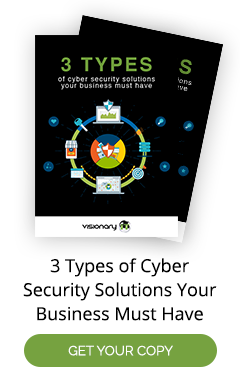Network Security: 6 Steps to Stay Safe
Create the best secure network with these 6 tips. Perfect for network security projects!
In today's world full of hackers, spammers, and malicious codes, the networks of most businesses and enterprises may suddenly not seem safe at all.
Have you, or your system, ever been hacked? If so, you're not alone!
Recently, the Ponemon Institute surveyed companies in the three most affected sectors - defense and aerospace, energy and utilities and finance in addition to health care, retail, and communication.
It found that every company surveyed were victims of a virus, Trojan or a worm-type of attack. 97% were victims of malware attacks and 76% were victims of a web-based attack.
Fortunately, professional help is always at hand!
You can strengthen your network capabilities and be a step ahead of the network intruders and hackers.
Here are 6 steps that will help you secure your network and stay safe.
#1-Adopt a Strong Password Policy
A weak password is all it takes for hackers to get into the network. Strong and complex passwords will go a long way in protecting your business.
You’re probably aware of hackers using simple software to breach a user’s account. So, it’s rather pointless to create passwords that are easy to remember. Chances are that the hackers will be able to guess it too!
Hence, network admins need to enforce device owners to create passwords that are difficult to guess.
Here is a quick guide on how to create a strong password.
- Ensure the password length is at least 12 to 15 characters.
- As a thumb rule, use 2 uppercase letters, 2 lowercase letters, 2 numbers and 2 special characters.
- Don't use whole words ever. Make the password as random as possible.
- Using personal information as part of your password is a big no-no!
- Don't use keyboard patterns. For instance, it was found that QWERTY was one of the top 20 most common passwords people create.
Another smart thing that can be done is to make the passwords expire every two or three months. This will reshuffle the passwords’ complexity and help them remain complicated at all times.
#2-Always Keep the Network Updated
Once the network access points are secured through strong passwords, you need to go a step further and ensure your network is infallible against any attacks.
One of the ways hackers can get into the system is by attacking through older versions of the software. So updating the Operating System, firmware, antivirus, device drivers as well as any other software in all the users’ device should be mandatory.
Once they are successfully updated, go ahead, review and change the default security settings to match your network policies. Ensure that you create strong passwords as well.
#3-Strengthen and Educate the Human Link
All hackers are aware that the weakest links in any networks are the users. This is exactly how the phishers employ social engineering to get into the network.
Another thing that can’t be ignored is vengeful employees. This is where setting up network privileges really helps. You don’t want a former or a disgruntled employee to disrupt your network, do you?
Educating your staff about the importance and effectiveness of general cyber security is a good starting point. They should realize the value of data privacy and be aware of how vital it is to keep the networks secure.
Unfortunately, not many employees are aware of the dangers. So spreading the word through emails, basic training courses or workshops and posters can help too!
#4-Don't Let Users Install Software
This may sound a bit too crass, but it’s really crucial to implement this.
Many businesses suffer from data loss and malware attacks because the employees with download privileges are simply incapable of distinguishing safe websites from malicious ones.
Bigger companies have IT departments who facilitate the software installation through their admin credentials because that is probably the simplest thing to do to stay safe.
But if you don’t really have the budget for an IT department, you can always hire professional services to monitor and maintain your network at a reasonable cost.
#5-Invest in, and Install a Trustworthy Firewall
The firewall application’s only job is to keep an eye out for anything suspicious! They are able to block unauthorized processes while letting the ones that are safe to access your network.
The best part is that firewalls can be configured for your hardware as well as your software. This mitigates the chances of hazardous files from entering your network.
Depending on the firewall application that you choose, it can monitor web traffic, block Trojan horses, prevent hacking attempts as well as fight keyloggers.
This article talks about how to install a firewall and keep your network safe from security threats. It goes on to explain the two kinds of firewalls that are available for software as well as hardware appliance.
Keep these things in mind while installing firewalls.
- The configuration of your firewall is best left to the professionals,
- The firewall shouldn't be too secure so as to disrupt employees from working.
- A mix of software firewall and hardware firewall is recommended to enhance protection.
#6-Make Backups a Habit
We can’t stress enough about how critical it is to back up all your important files and data. Because no matter how safe your network is, one wrong move and it can be hacked.
It’s always better to be safe than sorry. There’s absolutely nothing wrong in backing up a couple of months’ data and keeping them safe. In fact, it's one of the smartest things to do!
In the event of a network attack, you’ll not really lose anything because whatever was compromised can be easily retrieved!
Interestingly, the way backups are taken these days have also evolved. Traditional backups are prone to human errors, slow speeds, redundancy and compliance issues.
But you can always hire professional services who know a lot more about taking backups and keeping data safe.
With network security in place, your business will experience many benefits. It will be shielded against any disruption. This will help keep your employees productive too since there won’t be any downtime.
Network security also helps your business meet obligatory regulatory compliance because it helps protect your customers’ data. This will reduce the risk of any legal action due to data theft.
The most important benefit that network security offers is keeping your business’s reputation intact. Trust, reputation and reliability are the most important assets that any business can invest in.
So always ensure that your network is secured. It may seem like a huge and unnecessary cost now, but if you look at the bigger picture, you'll realize that it's nothing compared to losing customers, legal issues, or your data.


